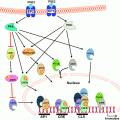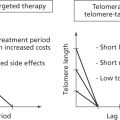Fig. 2.1
Number of publications on BMI and breast cancer over the last 3 decades. A Pubmed search was performed using search terms “body mass index” and “breast cancer” and plotted as number of articles per year
Obesity is associated with an increased risk of breast cancer, and is also positively associated with tumor size and a higher probability of having positive axillary lymph nodes and faster growing tumors [18–20]. Interestingly, higher energy intake also increases the risk of breast cancer [21]. It is well accepted that obesity increases the risk of developing breast cancer after menopause, and it has even been suggested that up to 50 % of postmenopausal breast cancers are attributable to obesity [22]. However, the degree of increased relative risk and whether or not this also holds true for premenopausal women is contentious. A number of meta-analyses have been performed in recent years examining the effect of BMI on breast cancer with age (Table 2.1). In 2012, Cheraghi et al. performed a meta-analysis of 50 studies, 15 cohort studies and 35 case-control studies involving 2,104,203 and 71,216 participants, respectively [23]. There was no significant effect of BMI on breast cancer risk in premenopausal women, but a direct and significant correlation was observed between BMI and breast cancer risk in postmenopausal women. This was consistent with findings from Bergstrom et al. who demonstrated that a one unit increase in BMI was associated with a 2 % increased risk of developing breast cancer in postmenopausal women [24], a relationship that was not found in the premenopausal group. A number of studies have also described obesity as strongly protective against breast cancer in premenopausal women [25–28]. This has been attributed, at least in part, to a greater number of anovulatory menstrual cycles and hence, decreased lifetime exposure to estrogens. Nevertheless, a study Biglia et al. demonstrated that high BMI was significantly associated with larger sized tumors in both pre- and postmenopausal women [20]. In this case, obese premenopausal women displayed more vascular infiltration and metastasis to axillary lymph nodes compared to healthy weight women. Moreover, a meta-analysis by Pierobon et al. revealed that obesity is a significant risk factor for triple negative breast cancers in pre- but not postmenopausal women [29]. Interestingly, there is also evidence for an association of BRCA1 mutations and BMI with breast cancer risk in premenopausal women (P = 0.045) [30].
Table 2.1
Effect of high BMI on breast cancer risk with respect to menopausal status
Type of study | Menopausal status | RR (95 % CI) | Reference |
|---|---|---|---|
Meta-analysis | Premenopausal | 0.93 (0.86–1.02) | Cheraghi et al. [23] |
Postmenopausal | 1.15 (1.07–1.24) | ||
Meta-analysis | Premenopausal | 0.98 (0.97–0.99)a | Bergström et al. [24] |
Postmenopausal | 1.02 (1.02–1.03)a | ||
Meta-analysis | Premenopausal | 1.43 (1.23–1.65) | Pierobon et al. [29] |
(Triple negative) | Postmenopausal | 0.99 (0.79–1.24) | |
Meta-analysis | Postmenopausal
Stay updated, free articles. Join our Telegram channel
Full access? Get Clinical Tree
 Get Clinical Tree app for offline access
Get Clinical Tree app for offline access

|


